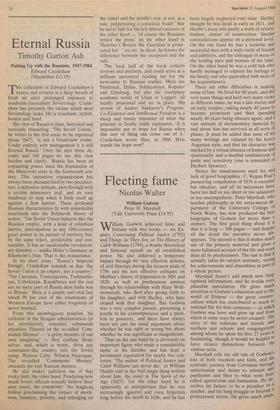Eternal Russia
Timothy Garton Ash
Putting Up with the Russians, 1947-1984 Edward Crankshaw (Macmillan £12.95)
This collection of Edward Crankshaw's essays and reviews is a deep breath of fresh air after prolonged exposure to academic-journalistic Sovietology. Crank- shaw has precisely the virtues which most Sovietology lacks. He is trenchant, stylish, honest and brief.
His view of Russia is clear, historical and curiously reassuring: 'The Soviet Union,' he writes in the first essay to be reprinted (from 1947), 'is not a brand-new realm. Under entirely new management it is still Eternal Russia.' Over the next three de- cades and 160 pages we see this view harden and clarify. 'Russia has been an expanding power since the foundation of the Muscovite state in the fourteenth cen- tury. This instinctive expansionism has always been characterised by two peculiari- ties: a defensive attitude, shot through with a certain missionary zeal, and an easy readiness to stop when it finds itself up against a firm barrier. These profound Russian characteristics fit with remarkable exactitude into the Bolshevik theory of action.' The Soviet Union behaves like the Russian empire, with a kind of relentless inertia, unscrupulous as any 19th-century great power in its pursuit of territory but, by the same token, predictable and con- tainable. It has no incalculable revolution- ary dynamic — unlike Hitler's Germany or Khomeini's Iran. That is the reassurance.
In his short essay, 'Russia's Imperial Design, Crankshaw reminds us that 'the Soviet Union is an empire, not a country.' 'The Caucasus, Transcaucasia, Turkmenis- tan, Uzbekistan, Kazakhstan and the rest are no more part of Russia than India was of Britain.' Here is a simple and vital fact which 99 per cent of the inhabitants of Western Europe have either forgotten or never learned.
From this unambiguous position, his criticism of the Reagan administration (in his introductory remarks) commands attention. Fixated on the so-called 'Com- munist Menace' — 'a grisly monster of our own imagining' — they confuse them- selves, and, which is worse, drive any communist-like country into the Soviet camp. Witness Cuba. Witness Nicaragua. The so-called 'Communist Menace' obscures the real Russian menace.
He also makes judicious use of that tricky limb, the other hand. Pondering how much Soviet officials actually believe their own creed, the comments: 'An Anglican bishop proclaiming the virtues of meek- ness, humility, poverty, and enlarging on the camel and the needle's eye, is not, as a rule, perpetrating a conscious fraud.' But he never falls for the left-liberal excesses of the other hand — 'of course the Russians censor the press, on the other hand in Thatcher's Britain the Guardian is prose- cuted for. .' etc etc. In short, he knows the difference between the exception and the rule.
The back half of the book collects reviews and prefaces, and could serve as a brilliant annotated reading list for the newcomer to Russian studies. Here are Pasternak, Djilas, Solzhenitsyn, Kopelev and Ginzburg, but also the exemplary academic works of Ulam or Leggett, all lucidly presented and set in place. His review of Andrei Sakharov's Progress, Co-Existence and Intellectual Freedom is a sharp and timely reminder of what the prisoner in Gorky really represents. 'It is impossible not to hope for Russia when this sort of thing can come out of it,' Crankshaw wrote then, in 1968. How stands the hope now?






































 Previous page
Previous page